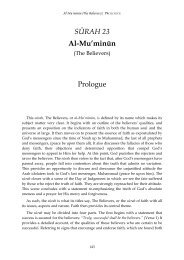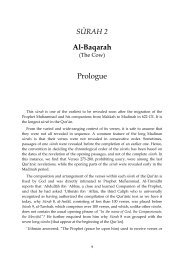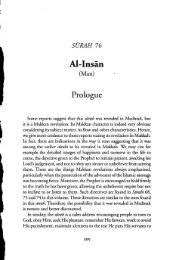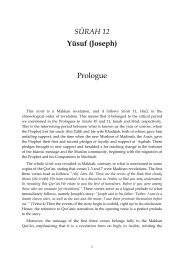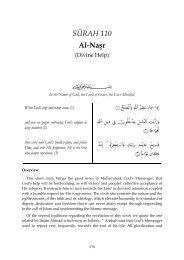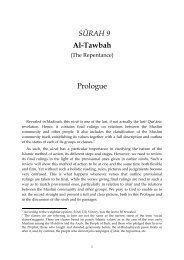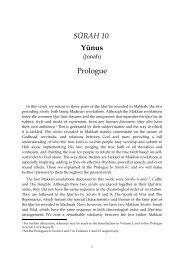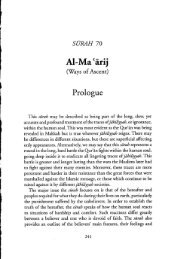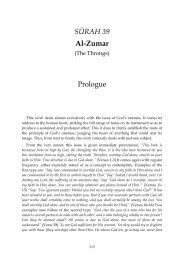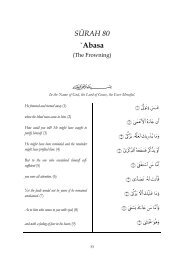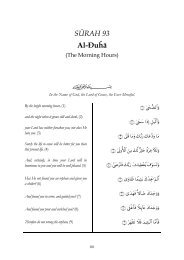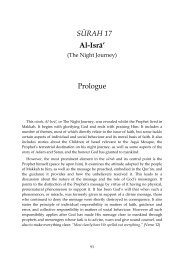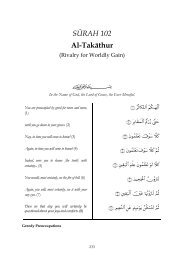31) Luqman - TAFSIR FI ZILAL AL-QURAN
31) Luqman - TAFSIR FI ZILAL AL-QURAN
31) Luqman - TAFSIR FI ZILAL AL-QURAN
Create successful ePaper yourself
Turn your PDF publications into a flip-book with our unique Google optimized e-Paper software.
Luqmān | GOD’S ABSOLUTE KNOWLEDGE<br />
their sizes, movements, dimensions, qualities and characteristics. They are made in<br />
deliberate measure and full harmony. Yet they are creatures that no one claims to<br />
have created, and no one alleges that any creator other than God has had a share in<br />
their making. They cannot have come into existence by themselves. Nor can they<br />
follow a system or establish harmony without elaborate planning or a planner. To<br />
suggest that they have existed by themselves, or as the result of coincidence, does not<br />
merit argument. Moreover, human nature profoundly rejects any such claim.<br />
Those who associated partners with God, and argued very strongly against the<br />
Prophet and his message, could not falsify the argument of their own nature when<br />
they were confronted with the universal proof of the creation of the heavens and the<br />
earth. Hence, they did not hesitate in their reply to the question: ‘Who has created the<br />
heavens and the earth?’ Their answer was clear: ‘God.’ Therefore, God directs His<br />
Messenger to comment on their answer thus: “Say: All praise is due to God alone.”<br />
(Verse 25) Praise is due to God for keeping the truth of the universe and its creation<br />
clear in human nature. The argument is discontinued so as to give a new comment:<br />
“Yet most of them do not understand.” (Verse 25) It is because they do not understand<br />
that they continue to argue, ignoring the logic of human nature and the fact that the<br />
whole universe points to its supreme Creator.<br />
The sūrah adds a statement of God’s ownership of all that is in the heavens and the<br />
earth, whether it is made available to man or not. He is in no need of anything in the<br />
heavens or the earth. He is praised even though people may not praise Him: “To God<br />
belongs all that is in the heavens and the earth. Indeed, God is the One who is self-sufficient,<br />
worthy of all praise.” (Verse 26)<br />
This presentation concludes with a scene of the universe which symbolizes God’s<br />
inexhaustible riches, and unlimited knowledge. It further expresses His supreme and<br />
ever-renewing ability to create and His unrestricted will:<br />
Were all the trees on earth to be made into pens, and the sea ink, with seven more seas<br />
yet added to it, the words of God would not be exhausted. God is indeed Almighty,<br />
Wise. The creation of you all and your resurrection is but like [the creation and<br />
resurrection of] a single soul. God hears all and sees all. (Verses 27-28)<br />
This scene is taken straight from people’s limited knowledge and observations,<br />
but aims to put before them the meaning of God’s ever- renewing will which is<br />
neither limited nor restrained. Their minds cannot visualize this concept without<br />
such a comparison. People record their knowledge and speeches, and sign their<br />
orders, using pens, which used to be made of reed, and ink which hardly filled an<br />
inkpot or a bottle. The comparison drawn here shows them that if all the trees on<br />
earth were made into pens, and all the seas were made into ink this would still be<br />
343



